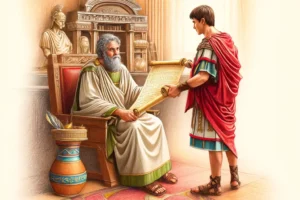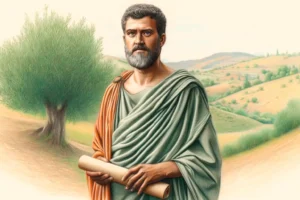
Joseph of Arimathea: Provided his own Tomb for Jesus’ Burial
Joseph of Arimathea, a prominent figure in the New Testament, is known for providing his own tomb for the burial of Jesus. His act of devotion and courage ensured that Jesus received a proper burial.
Quick Facts
- Prominent Member of the Sanhedrin: Joseph was a respected member of the Jewish council, the Sanhedrin.
- Secret Disciple of Jesus: He was a follower of Jesus, but kept his faith secret due to fear of the Jewish leaders.
- Wealthy Man: Joseph was a wealthy man, which allowed him to own a new tomb.
- Bold Action: After Jesus’ crucifixion, Joseph boldly asked Pilate for Jesus’ body.
- Tomb Provision: He provided his own newly hewn tomb for Jesus’ burial.
- Assisted by Nicodemus: Nicodemus, another secret follower of Jesus, helped Joseph prepare Jesus’ body for burial.
- Fulfillment of Prophecy: His act fulfilled the prophecy that Jesus would be buried with the rich (Isaiah 53:9).
Historical and Cultural Context
Joseph of Arimathea appears in the Gospels of Matthew, Mark, Luke, and John. He was from Arimathea, a town in Judea, and is described as a respected member of the Sanhedrin, the Jewish ruling council. The Sanhedrin was a powerful body responsible for religious and legal decisions among the Jews. As a member, Joseph would have had significant social and political influence.
Secret Disciple of Jesus
Despite his prominent position, Joseph was a secret disciple of Jesus. The Gospels note his fear of the Jewish leaders, which likely influenced his decision to keep his faith private (John 19:38). His fear highlights the tension and risk involved in being associated with Jesus, especially among the Jewish elite who largely opposed Jesus’ teachings.
Wealth and Generosity
Joseph’s wealth is significant because it enabled him to own a new tomb carved out of rock, located near Jerusalem (Matthew 27:60). This tomb, likely intended for himself or his family, was unused, making it a suitable and honorable place for Jesus’ burial. This act of generosity is notable given the potential repercussions he faced.
Bold Request to Pilate
Following Jesus’ crucifixion, Joseph took a courageous step by approaching Pilate, the Roman governor, to ask for Jesus’ body (Mark 15:43). This bold request required significant bravery, as it publicly identified him with Jesus at a time when Jesus’ followers were in hiding. Pilate, surprised that Jesus was already dead, confirmed with the centurion before granting Joseph’s request (Mark 15:44-45).
Preparation and Burial
Joseph, assisted by Nicodemus, took Jesus’ body down from the cross and wrapped it in a clean linen cloth (John 19:39-40). Nicodemus brought a mixture of myrrh and aloes, about seventy-five pounds, indicating their respect and care in preparing the body for burial according to Jewish customs. They placed Jesus in the new tomb, which was then sealed with a large stone (Matthew 27:59-60).
Fulfillment of Prophecy
Joseph’s provision of his own tomb for Jesus’ burial fulfilled the prophecy in Isaiah 53:9, which stated that the Messiah would be buried with the rich. This act not only provided Jesus with an honorable burial but also connected Jesus’ death to the fulfillment of Old Testament prophecy, reinforcing his identity as the Messiah.
Theological Significance
Joseph of Arimathea’s actions carry several theological implications:
- Courage and Discipleship: Joseph’s boldness in requesting Jesus’ body exemplifies the courage required to be a true disciple of Jesus, especially under threat of persecution.
- Fulfillment of Scripture: His actions underscore the fulfillment of Messianic prophecies, affirming the divine plan in Jesus’ death and burial.
- Respect for the Body: The care and respect shown in Jesus’ burial highlight the importance of honoring the deceased, a value deeply rooted in Jewish tradition and Christian practice.
Legacy and Impact
Joseph of Arimathea is remembered as a courageous and devoted follower of Jesus. His willingness to risk his status and safety to ensure Jesus received a proper burial is celebrated in Christian tradition. His actions are commemorated in the liturgies of many Christian denominations, particularly during Holy Week and Easter.
Conclusion
Joseph of Arimathea, a wealthy and respected member of the Sanhedrin, played a crucial role in the burial of Jesus. His courageous request to Pilate and provision of his own tomb fulfilled prophecy and demonstrated deep respect and devotion. Joseph’s story highlights the themes of courage, discipleship, and the fulfillment of God’s plan.



